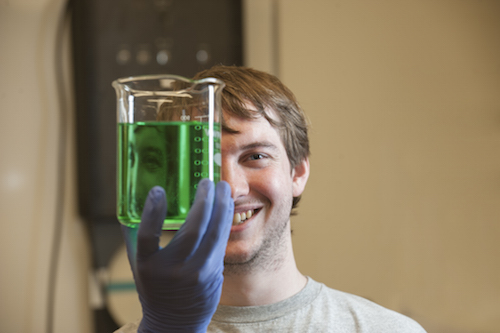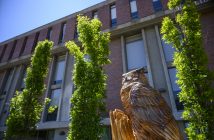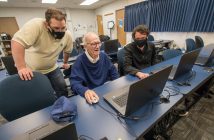Biology Professor Robin E. White, Ph.D., tapped Robert Haluska ’17 at the end of his freshman year to work with her on a research project on the effects of high-fat diets on alternative energy sources of the brain. Dr. White felt Haluska was exactly the kind of exceptional student who could benefit from the University’s mission to provide undergraduates with research opportunities normally reserved for graduate students.
“He is hard-working and incredibly dedicated,” she says. “I look to see that research students are smart and that they really care about their project.”
Entering his junior year this fall, pursuing a degree in biology, Haluska’s resume so far could be mistaken for a senior’s. Under Dr. White’s guidance, Haluska, 20, presented his research on how ketone bodies, energy sources from fat (rather than carbohydrates), affect the health of neuronal support cells called astrocytes, at the national Experimental Biology Conference in Boston in April.
Haluska admits the experience was overwhelming at first, as he was surrounded by college students from all over the country as well as international students from countries such as Ireland and China. For about two hours, he shared his research using a poster to depict his findings and answered questions from interested parties. He was also able to view other students’ research and attend talks, such as one on the effects of space and organismal growth.
One of the highlights of the conference for Haluska was being approached by a Boston College professor who was conducting similar research but was using human astrocytes rather than those of rats. The two exchanged information about each other’s work. “That was pretty cool,” Haluska says.
Haluska says sharing his research with other students in the field of biology, especially at such a young age, is an experience that will benefit him after college—either in a job or in graduate school. Knowing such an opportunity was available at Westfield State was a driving force in his decision to enroll.
As a fairly new faculty member, Dr. White says likewise. She came to the University because supervising undergraduates who have the opportunity to showcase their research is a bright spot in her teaching. “It’s incredibly exciting at this stage in my career to have trained a student and see him explain our work and watch him take charge and take ownership of it,” she says. “It’s really fun for me to know he understands the work and is invested in it.”




